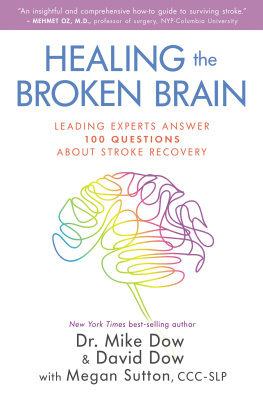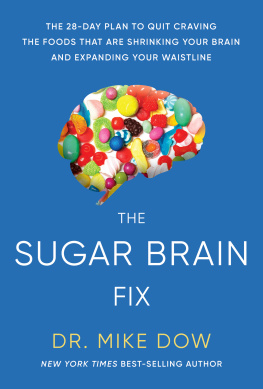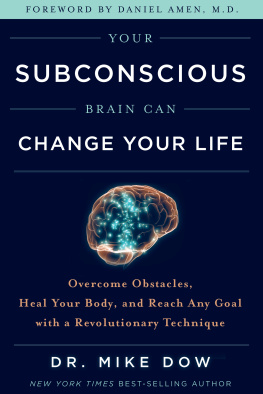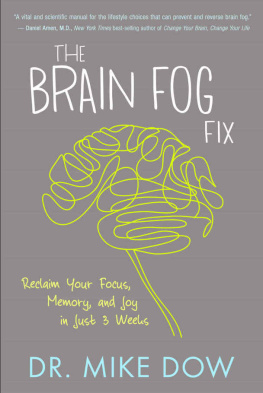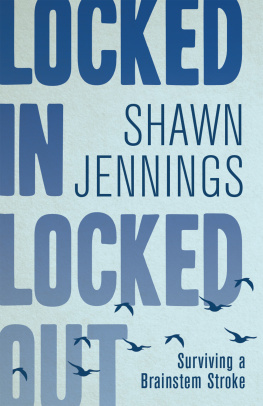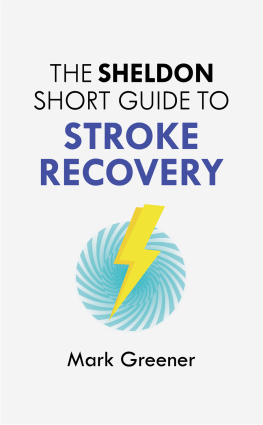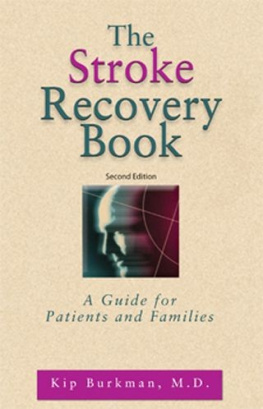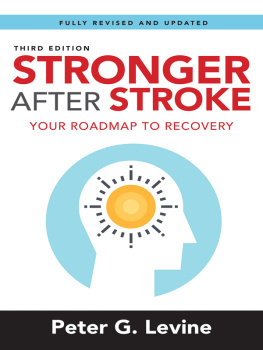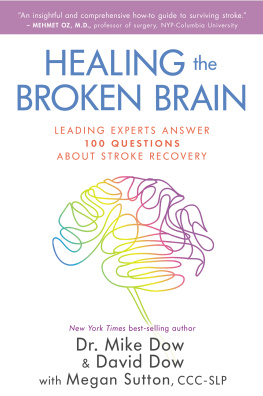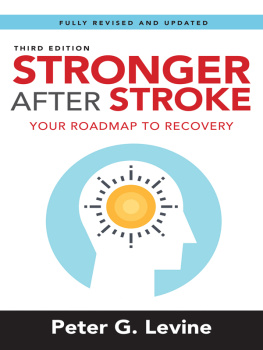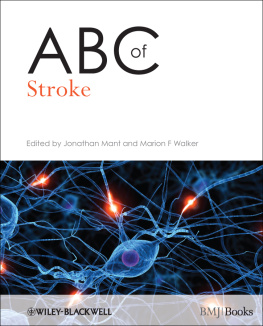Praise for

An insightful and comprehensive how-to guide to surviving stroke.
Mehmet Oz, M.D., professor of surgery, NewYork-Presbyterian/
Columbia University Medical Center
A groundbreaking guide for the prevention and treatment of stroke.
Daniel Amen, M.D.,New York Times best-selling author of
The Brain Warriors Way
As the mother of a child who suffered a life-threatening brain injury, I
know the power of combining hope with science in healing broken brains.
With this book, Mike and David have provided that combination to all
stroke survivors and the family members who believe in them.
JJ Virgin,New York Times best-selling author of Miracle Mindset
Dr. Mike and his brother David reveal a profound truth in this incredible
book: spiritual growth and faith are required when faced with lifes most
difficult roadblocks.
Gabrielle Bernstein, #1 New York Times best-selling author of
The Universe Has Your Back
Patience, mindfulness, and optimism are all tools needed in the recovery
journey from a stroke. Dr. Mike Dow and his brother do an amazing job
delivering a healthy dose of inspiration and insight.
A must read for survivors and caregivers!
Dr. Susan Albers,New York Times best-selling author of 50 Ways to
Soothe Yourself Without Food, Eating Mindfully, and Eat.Q.
This book should be required reading for all stroke survivors
and the people who love them.
Tana Amen, B.S.N., R.N.,New York Times best-selling author of
The Omni Diet
This thorough and compassionate guide for families and survivors will
provide relief, comfort, and wisdom to all who read it.
Andrea Pennington, M.D., C.Ac., best-selling author of
Daily Compassion Meditation
As the family member of a stroke survivor, I know it takes a village of
doctors to optimize recovery. Mike and David have delivered this village to
all stroke survivors and their families through this life-changing book.
Allison Arthur, M.D., Mayo Clinic-trained physician and co-owner of
Sand Lake Dermatology Center
ALSO BY DR. MIKE DOW
The Brain Fog Fix: Reclaim Your Focus, Memory,
and Joy in Just 3 Weeks
Diet Rehab: 28 Days to Finally Stop
Craving the Foods That Make You Fat
ALSO BY DAVID DOW
Brain Attack: My Journey of Recovery from Stroke and Aphasia
Copyright 2017 by Dr. Mike Dow Enterprises, Inc.
Published and distributed in the United States by: Hay House, Inc.: www.hayhouse.com Published and distributed in Australia by: Hay House Australia Pty. Ltd.: www.hayhouse.com.au Published and distributed in the United Kingdom by: Hay House UK, Ltd.: www.hayhouse.co.uk Published and distributed in the Republic of South Africa by: Hay House SA (Pty), Ltd.: www.hayhouse.co.za Distributed in Canada by: Raincoast Books: www.raincoast.com Published in India by: Hay House Publishers India: www.hayhouse.co.in
Cover Designer: Tricia Breidenthal Interior design: Pamela Homan Indexer: Jay Kreider MRI image and photo of young David Dow in ICU on page xxi: Carol Dow-Richards Photo of adult David Dow on page xxi: Barbara Baie
All rights reserved. No part of this book may be reproduced by any mechanical, photographic, or electronic process, or in the form of a phonographic recording; nor may it be stored in a retrieval system, transmitted, or otherwise be copied for public or private useother than for fair use as brief quotations embodied in articles and reviewswithout prior written permission of the publisher.
The authors of this book do not dispense medical advice or prescribe the use of any technique as a form of treatment for physical, emotional, or medical problems without the advice of a physician, either directly or indirectly. The intent of the authors is only to offer information of a general nature to help you in your quest for emotional, physical, and spiritual well-being. In the event you use any of the information in this book for yourself, the authors and the publisher assume no responsibility for your actions.
Library of Congress Cataloging-in-Publication Data
Names: Dow, Mike, author. | Dow, David, author. | Sutton, Megan, author.
Title: Healing the broken brain : leading experts answer 100 questions about stroke recovery / Dr. Mike Dow and David Dow, with Megan Sutton, CCC-SLP.
Description: Carlsbad, California : Hay House, Inc., [2017]
Identifiers: LCCN 2016046665 | ISBN 9781401952655 (paperback)
Subjects: LCSH: Cerebrovascular disease--Treatment. | Cerebrovascular disease--Miscellanea. | BI-SAC: HEALTH & FITNESS / Diseases / Nervous System (incl. Brain). | HEALTH & FITNESS / General. | HEALTH & FITNESS / Diseases / General.
Classification: LCC RC388.5 .D69 2017 | DDC 616.8/1--dc23 LC record available at https://lccn.loc.gov/2016046665
Tradepaper ISBN: 978-1-4019-5265-5
10 9 8 7 6 5 4 3 2 1
1st edition, May 2017
Printed in the United States of America
CONTENTS
In the treatment of brain injury the story starts out darkly. The
patient is a shadow: damaged, frightened, and withdrawn. But
as physicians, therapists, and family connect, hope grows anew,
recovery begins, and pages turn. And it is an appreciation
of the simplest parts of ourselves, something simpler than
we could ever believe, that begins personal recovery on the
neurorehabilitation unit. When we can make these shadows
dance, that is the art of brain repair.
Dr. Tom Carmichael
Moments that drastically change your life tend to come out of nowhere. Theyre like unexpected and unwanted guests. You: the unprepared and unwilling host. As youre left blindsided and bewildered, you are immediately thrust into a new reality and must come to terms with a new normal whether you like it or not. My family had one of those days 20 years ago when my brother, David, had a massive stroke. He was just 10 years old.
If youre reading this book, it probably means you or someone you love has had a stroke. You or your loved one is now a stroke survivor. You can probably relate to the feelings of confusion that my brother and family felt when we were dealing with the initial onslaught of information about stroke. Its hard to fully comprehend everything being said by the team of specialists flooding your hospital roomespecially if you happen to be a stroke survivor with newly impaired language skills.
I remember walking down a depressing hospital hallway with my mom as she cried, telling me that David had something called aphasia. As a 15-year-old, Id never heard that word before. To me, this confusing word felt like he had yet another problem on top of the stroke. People kept saying this word with the same tone you might use if you were saying a phrase like stage-four cancer.
Like many of you, I have my own traumatic memories. I saw my mom lose it in a department store as she was too exhausted to pick out a new shirt after she had run out of clean clothes, having practically lived at the hospital. I remember that feeling of dread in my stomach when I realized that something had changed and life would never go back to the way it was before.
This is our familys story, but I know you have your own personal experience. Like snowflakes, each stroke is unique. Different parts of the brain affect different language skills, body parts, behavior, mood, and even who we are. Doctors will sum up this frightening mixed bag youve been handed with medical terms and acronyms that will sound like a foreign language. And as human beings, the unfamiliar and unknown is inherently scarier than challenges or situations we understand. Most experts just dont have the time to fully educate you on everything you need to know in the 10 minutes they have before they need to get ready for their next patient. And, that next patient needs their help as much as you do. But that doesnt change the fact that youre still left wanting more.
Next page
